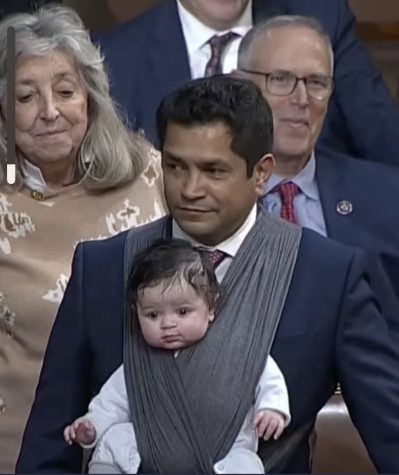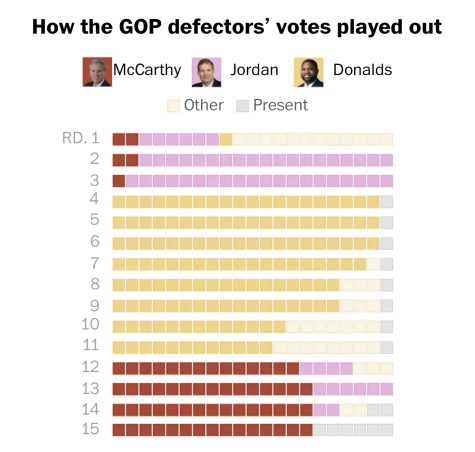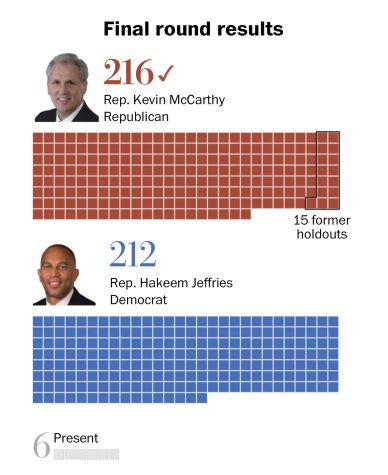The Longest House Speaker Race Since 1859
Representative Kevin McCarthy was elected as the House Speaker for the 118th Congress on Saturday, January 7th, on the 15th vote held. This marked the longest Speaker race in 164 years, with 100 years passing since multiple votes were required to elect a speaker. Prior to the election of McCarthy as House Speaker, The Blue and White was able to interview Mr. Whitcomb and Mr. Houvouras for additional insight into the situation at hand.

The process to elect a Speaker began on January 3rd at noon, the date that the Constitution mandates the new Congress is to be convened. On this first day of voting, 3 separate votes were held, and McCarthy did not reach the 218-vote threshold required to become House Speaker. Without the election of a Speaker, the House of Representatives was unable to conduct any business, including the swearing-in of Representatives. This meant that many representatives who brought their families were unable to see them sworn in, leading to many viral photos of sleepy children in the House chamber.
Mr. Houvouras warned that “any concessions made will not be made with good faith. A person like Kevin McCarthy, who has absolutely no integrity, will shake your hand and will tell you that he will give you an ex-amount of seats on this committee, but he cannot be trusted, and that is what’s going on right now, that even his own party doesn’t trust him. They know what a wishy-washy flip-flopping hypocrite he is, and in a party of wishy-washy hypocrites, even they don’t like him.”

However, after 3 days and 11 unsuccessful votes, concessions had to be made. Going into Friday, the 6th, these concessions offered worked, with McCarthy getting 213 votes in the 12th round, 13 more than in the 11th round of voting the evening prior. After gaining 3 more votes in two more rounds on Friday, the 15th and final vote for the Speaker ended around 12:30 a.m. the next day, with McCarthy getting the same 216 votes. However, he got six Representatives to vote ‘present,’ thus lowering the threshold required to win, securing him the Speaker title. He received his gavel around 1:00 a.m., and representatives were finally sworn in by 1:30 a.m. that Saturday morning.
Key concessions given by McCarthy included allowing one lawmaker to trigger a speakership election (essentially a vote of no confidence), limits on government spending, preferential spots on House subcommittees for holdouts, and other changes to House rules. Representatives on both sides of the aisle expressed concerns about the closed-door nature of these concessions, as the majority of representatives do not know the entire deal promised to the holdouts.

Opinions varied on whether the fault lay with Rep. McCarthy or with the Freedom Caucus, with Mr. Whitcomb explaining, “I think it’s McCarthy’s job to get the majority. That’s your job if you want to be the Speaker of the House. So his job is to convince enough people, 218 people, that he’s the man for the job. I don’t think you can blame anyone but McCarthy, it’s his responsibility.” In contrast, Mr. Houvouras stated, “I think there is plenty of blame to go around. You’ve got a group of lunatics who are hoping to overthrow a democratically elected government, and they are holding the rest of their party hostage essentially. However, if their party ever had the intestinal fortitude to stand up to them and the lunatic base of their party, then they wouldn’t have to worry about this. But as it is, none of the moderates want to oppose the fanatics, because the moderates believe that they will be treated like Liz Cheney, censored, treated poorly, ousted by the party because they’re acting like a normal politician.”
There was some common ground, however, in that there is a clear divide within the Republican Party. On this divide, Mr. Houvouras stated, “Absolutely, there is clearly an obvious fascist-leaning side of the Republican Party. And because the moderates have not pushed back hard enough against this in the last 5-6 years, they are now reaping what they have sown. If they had had some pushback, we say this about other countries all the time, when we look at countries where there is an Islamic fascist government in charge, such as Iran, we are always like ‘where are the moderates?’ and what we are seeing in our country is that we are no different in that the moderates haven’t done enough.”
While sharing similar thoughts about the divide within the GOP, Mr. Whitcomb sees the split differently, saying, “It is going in three directions: you got your Trump and who’s going down with that train, you got the establishment, which many people in the Freedom Caucus think McCarthy is an establishment guy who will keep doing the same things, then you got your new ‘I don’t want Trump, and I don’t want establishment.'”
In contrast, the Democrats were united around Rep. Hakeem Jeffries, who received all 212 votes from his party (when all members were present), receiving more votes than Speaker McCarthy in the majority of rounds. With this, he became the first African-American lawmaker to lead a party in Congress.
Following a disappointing midterm cycle for the GOP, this divisiveness leaves a lot of questions left to be answered looking forward. With the 2024 presidential cycle less than 2 years away, presidential campaigns will start in late 2023. At this time, Republican leaders and voters alike will have to decide whether to throw their support behind Trump once again, or whether to move on to someone new.

I’m Elijah Nuebel, a senior at Apopka High. I have been on The Blue and White for the last two years as a staff writer, and this year I am proud to be...





